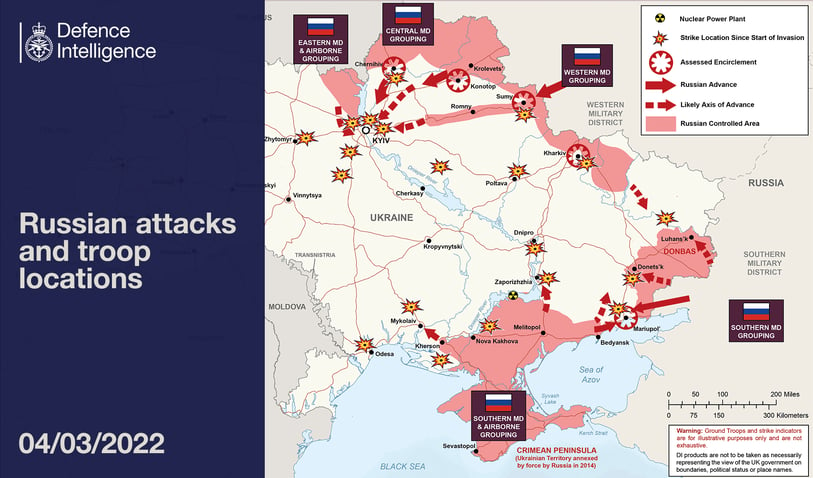Situation update
- Those in Russia should leave the country now before transit options disappear or border controls are implemented. Commercial flight options are disappearing due to route closures, lack of insurance coverage, and suspension of Western parts and maintenance contracts. Russia's aviation sector may not survive sanctions, and private charter flight options are extremely limited.
- Russian airline S7 has announced the suspension of all international flights after one of its planes was seized by the leasing company that owns it while in Yerevan, Armenia. This risk could halt all international flights out of Russia.
- President Putin has yet to comment on the rumors that the Russian state may institute martial law that are causing some Russians to flee the country. Kremlin spokesman Dmitry Peskov made the first official reaction, denying rumors as “hoaxes”.
- Russian legislation outlawing “public dissemination of false information about the use of the Russian military” could be in effect as soon as tomorrow, 05 March. The bill includes:
- Imprisonment for sharing any information opposite the official Russian view of its offensive in Ukraine. Longer sentences are attached to information shared as part of the accused’s job duties and if authorities determine sharing it has “serious consequences”.
- Fines for criticizing the Russian military.
- Fines or forced labor for calling for sanctions against Russia.
- The list of popular websites accessible from Russia continues to shrink as Facebook, Twitter, BBC, and independent Russian press outlets are blocked.
- The Moscow Stock exchange will remain closed until at least 09 March. Russia’s largest exchange shut its doors on 28 February, making this its longest shutdown in the country’s history.
- Russia and Ukraine have agreed to establish humanitarian corridors to allow evacuation and aid services to reach civilians in Ukraine. The dates and actual implementation have yet to be decided. But all real diplomatic solutions are off the table as both sides see it in their best interest to gain further leverage on the battlefield before making any politically painful concessions.
- In two moves to lower international tensions, NATO formally rejected Ukraine’s plea to establish a no-fly zone and the U.S. and Russia agreed to create a military communication line to prevent accidental escalation in Eastern Europe.
- After capturing the Zaporizhzhia nuclear power plant, Russia controls a fifth of Ukraine’s power supply. Russian forces are now also around 30km from the South Ukraine Nuclear Power Plant.
- The Ukrainian armed forces have begun a counter-offensive to weaken the Russian forces on Kyiv’s western flank.
- A Russian pattern of fighting has emerged: bombardment at night and force maneuvers during the day.
- Over 1,200,000 Ukrainian refugees have fled to neighboring countries (predominantly Poland). Over 1,000,000 people in Ukraine are internally displaced. The United Nations estimates up to four million people could flee Ukraine in the coming weeks and months. This will strain resources across Europe.
Support
Our team can respond immediately with the following capabilities:
- Bespoke intelligence reports and briefings
- Armed or unarmed security personnel
- Satellite communications (phone and wireless internet)
- Emergency medical and tele-medical support
- Logistical support (food, water, generators, fuel)
- Evacuation by ground, air, or sea
Click below to contact Global Guardian's 24/7 Operations Center or call us directly at +1 (703) 566-9463.





